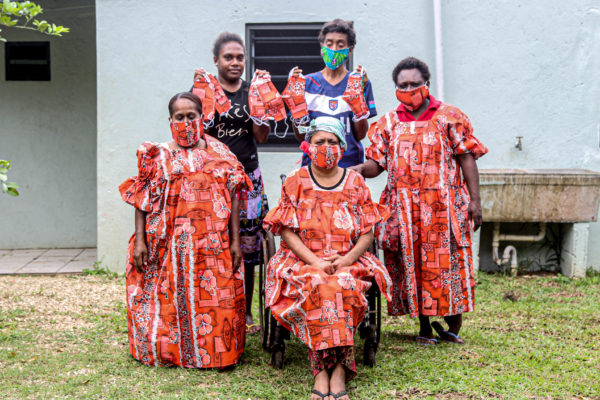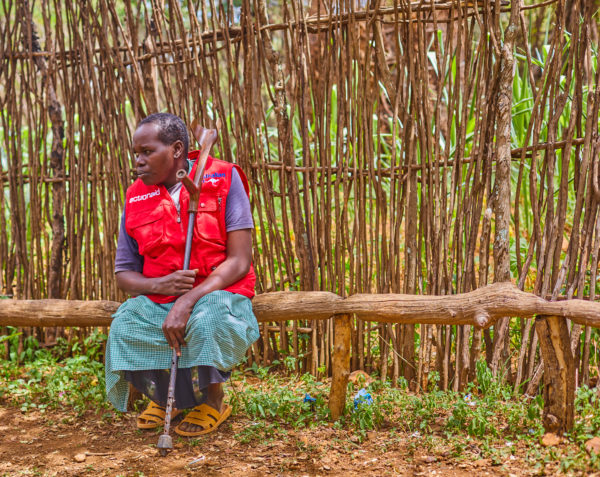During times of crisis – whether it be a cyclone, drought, or the pandemic – women and girls with disabilities face specific challenges that put their wellbeing, safety, and livelihoods at risk.
The needs of women and girls with disabilities are often overlooked, and they are rarely given the opportunity to lead. For example, evacuation centres are often inaccessible for women and girls who use wheelchairs or have a mobility impairment. Emergency communications systems like Tsunami warnings can often be inaccessible for those with a hearing or visual impairment.
Inaccessible and non-inclusive emergency responses threaten the safety of women and girls with disabilities and puts them at a greater risk of violence and exploitation.
As climate change causes more severe and devastating cyclones, drought, and flooding, the voices, demands and needs of women and girls with disabilities must be prioritised, and they should feel empowered to lead humanitarian responses to crises.
We are working with partners across the world to support women with disabilities to advocate for their rights and amplify their voices at all levels of disaster management and climate change decision-making.
The women with disabilities in Vanuatu and Kenya who are redesigning humanitarian responses
The Women I Tok Tok Tugeta Sunshine Network
In Vanuatu, the Women I Tok Tok Tugeta Sunshine (WITTT Sunshine) Network – a program designed by and for women with disabilities – supports women to lead programming on climate resilience, Disaster Risk Reduction (DRR) and humanitarian response. This programme is supported by ActionAid, the Australian Department of Foreign Affairs (DFAT) and the Australian NGO Cooperation Program (ANCP).
Currently, there are 400 women with disabilities registered with the network, who are leading organising efforts across five islands – Erromango, Efate, Malo, Malekula and Tanna.
 Women with disabilities in the network have been trained to lead on humanitarian emergency communications using an SMS emergency communication platform. This means when a disaster hits, all emergency communications are inclusive and responsive to the diverse needs of women with disabilities.
Women with disabilities in the network have been trained to lead on humanitarian emergency communications using an SMS emergency communication platform. This means when a disaster hits, all emergency communications are inclusive and responsive to the diverse needs of women with disabilities.
Ellen Tamata, a WITTT Sunshine member who uses a wheelchair, explains why it is vital for women with disabilities to have a voice in disaster planning and response: “Women with disabilities know what they want. People without disabilities will not understand our challenges so when we are trained, we will have a voice and we will speak up for ourselves in whatever situation we face and during a disaster we will be prepared.”
Tangulbei Local Rights Programme: Jane’s Story
Kenya is facing its worst drought in four decades after consecutive failed rainy seasons. For women and girls with disabilities the drought has worsened existing inequalities and created new hardships such loss of income and greater difficulties accessing healthcare.
After losing her livelihood to climate induced drought, Jane, a woman with disability, joined trainings on women’s rights and farming techniques run by ActionAid Kenya. She learnt climate-resilient agriculture practices, which she used to establish a small farming business.
 “Through ActionAid training, I have learned to stop using fertilizers and chemicals on my farm and to use our kitchen waste on my shamba for healthier and more organic produce. I have learnt as a person with disability, I can be independent too and earn a living without waiting on my relatives and friends.”
“Through ActionAid training, I have learned to stop using fertilizers and chemicals on my farm and to use our kitchen waste on my shamba for healthier and more organic produce. I have learnt as a person with disability, I can be independent too and earn a living without waiting on my relatives and friends.”
Since the trainings, Jane has felt empowered to raise her voice and amplify the demands of women with disabilities within her community. She has since supported 15 women, including five women living with disability, to plant kitchen gardens and sell their produce at the local market.
No one understands the complexities and challenges facing women and girls with disabilities during a humanitarian crisis better than women with disabilities themselves. This International Day for Persons with Disability, join us in celebrating women like Ellen and Jane who are making sure no one is left behind.